Introduction
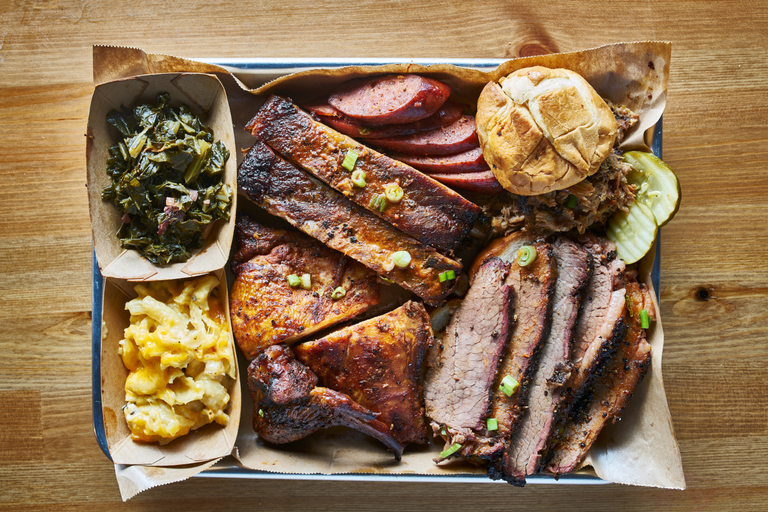
Barbecue is deeply ingrained in American culinary tradition, with each region boasting its own unique flavors and techniques. One key component of barbecue is brisket, a tough cut of meat that becomes tender and flavorful when cooked low and slow. However, what might be universally referred to as “brisket” in one region might have a different name in another. This article will explore the various regional terminologies for brisket in popular American BBQ styles such as Texas, Kansas City, Memphis, and Carolina. Join us as we delve into the diverse world of BBQ terminology and uncover the cultural significance behind each regional tradition.
What Is Brisket?
Brisket is a cut of meat that comes from the well-exercised lower pectoral muscle of a cow. It is known for its rich flavor and tender texture, but it can be tough and chewy if not cooked properly. Brisket contains a lot of connective tissue, which makes it naturally tough and leathery. However, through the art of barbecue, pitmasters have perfected the technique of smoking brisket low and slow for hours, allowing the connective tissue to break down and transform the meat into a melt-in-your-mouth delicacy.
Regional Variations In BBQ Terminology
Regional variations in BBQ terminology can be seen across different parts of the United States. While the concept of brisket remains consistent, the names used to refer to it can differ. In Texas, it is simply called “brisket,” reflecting the state’s strong barbecue culture. In Kansas City, it is commonly known as “burnt ends” due to the unique way it is cooked. In Memphis, it is referred to as “BBQ shoulder” or “pulled pork.” Meanwhile, in the Carolinas, brisket is less common, and pork cuts like pork shoulder and ribs are the primary focus. These regional variations highlight the diverse barbecue traditions found throughout the country.
Texas Terminology
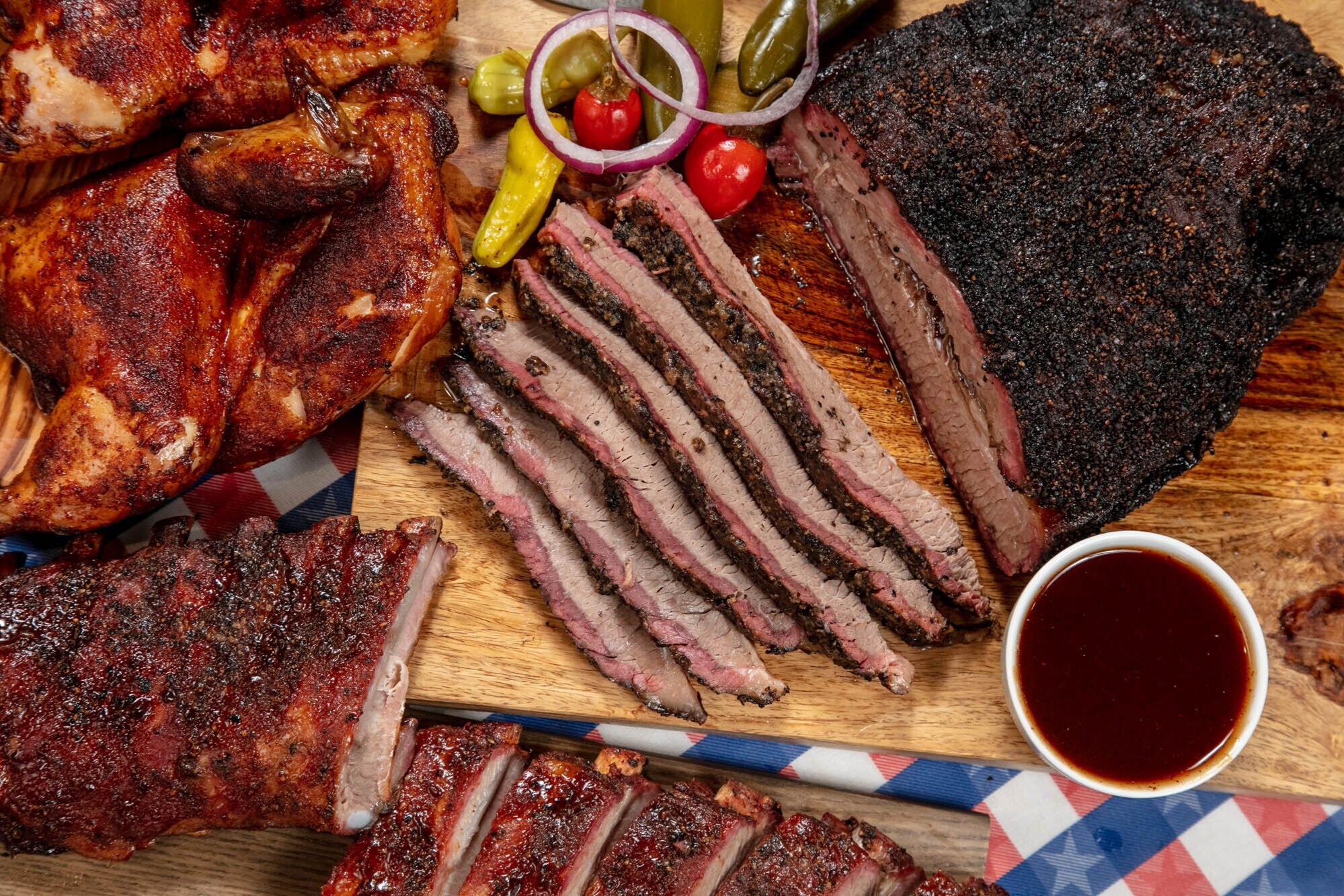
When it comes to BBQ terminology in Texas, brisket takes the spotlight. Known for its strong barbecue culture, Texas keeps it simple and straightforward by referring to brisket as “brisket.” There’s no need for fancy names or variations – just the delicious, tender cut of beef that has become a staple in Texas BBQ. Whether it’s smoked low and slow or cooked to perfection on an open pit, Texans take pride in their brisket and it remains a beloved dish in the state’s BBQ tradition. So when in Texas, make sure to indulge in some mouthwatering brisket!
Brisket In Texas BBQ
Brisket is a star in Texas BBQ. Known for its strong barbecue culture, Texas keeps it simple and straightforward by referring to brisket as “brisket.” Whether smoked low and slow or cooked to perfection on an open pit, the Texans take pride in their brisket. It remains a beloved dish in the state’s BBQ tradition. So, when in Texas, make sure to indulge in some mouthwatering brisket and savor the delicious, tender cut of beef that has become a staple in Texas BBQ.
Texas BBQ Slang For Brisket
In Texas BBQ culture, brisket holds a special place, and there are a few slang terms used to refer to this mouthwatering meat. Texans often use the term “Texas Gold” or simply “Gold” to describe their beloved brisket. Another slang term commonly heard is “Black Pepper Gold” due to the seasoning rubs used on the meat. The emphasis on the rich flavor and tender texture of the brisket is evident in these slang terms, showcasing the deep appreciation Texans have for their signature BBQ dish.
Kansas City Terminology
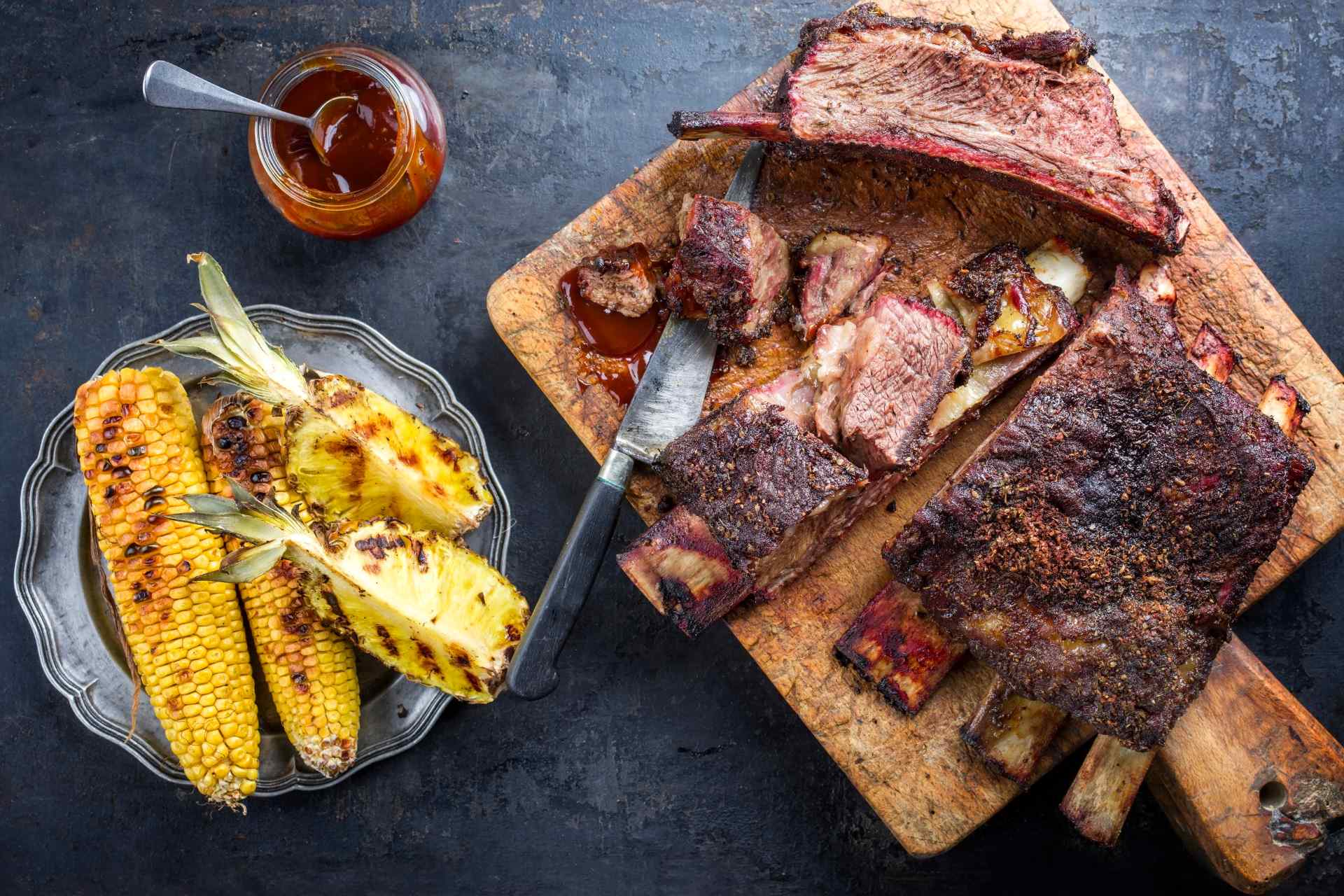
In Kansas City BBQ, brisket is a staple and is often referred to as the “king” of meats. It is slow-smoked to perfection and is known for its tender and juicy texture. Kansas City BBQ enthusiasts have their own terminology when it comes to talking about brisket. They commonly use the term “burnt ends” to refer to the flavorful and caramelized pieces of brisket that are cut from the point end. These burnt ends are a highly sought-after delicacy in Kansas City BBQ culture, showcasing the rich and smoky flavors that the region is known for.
Brisket In Kansas City BBQ
Brisket holds a special place in Kansas City BBQ. It is considered the “king” of meats and is slow-smoked to perfection. In Kansas City, they have a unique term for the flavorful and caramelized pieces of brisket known as “burnt ends.” These coveted delicacies are cut from the point end of the brisket and showcase the rich and smoky flavors that Kansas City BBQ is known for. The burn ends are a true highlight in Kansas City BBQ culture, representing the region’s commitment to tender and mouthwatering meat.
Kansas City BBQ Slang For Brisket
Kansas City BBQ enthusiasts have their own slang when it comes to brisket. The most notable term is “burnt ends.” These delectable pieces of caramelized brisket are cut from the point end and are highly prized in Kansas City BBQ culture. The term “burnt ends” refers to the flavorful and charred exterior of the brisket, showcasing the rich and smoky flavors that Kansas City BBQ is renowned for. It represents the region’s commitment to tender and mouthwatering meat, and is a true highlight in the Kansas City barbecue scene.
Memphis Terminology
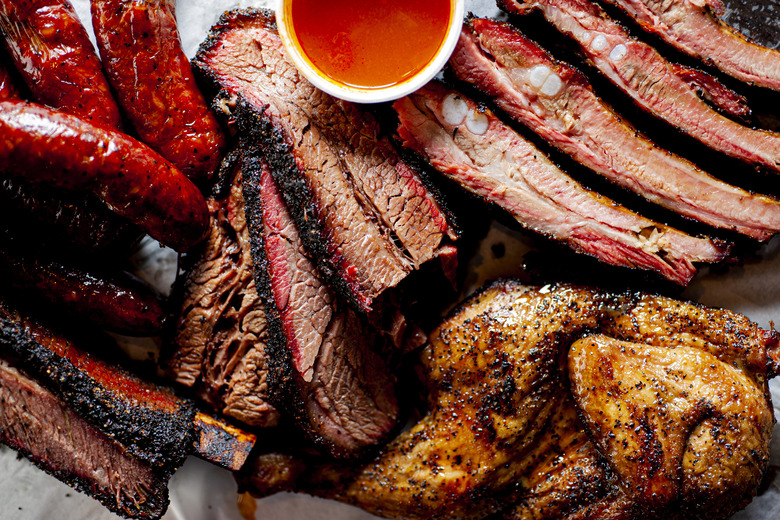
Memphis, known as the BBQ capital of the world, has its own distinct terminology when it comes to brisket. In Memphis BBQ, brisket is primarily used for making pulled pork sandwiches. The term “pulled pork” refers to the process of slow-cooking the pork shoulder until it becomes tender enough to be pulled apart by hand. This technique results in flavorful, juicy meat that is often topped with Memphis-style BBQ sauce, which is tangy and slightly sweet. Additionally, in Memphis BBQ culture, the term “dry rub” is commonly used to describe the seasoning mixture applied to the meat before cooking, adding a perfect balance of savory and smoky flavors. Overall, Memphis BBQ terminology showcases the region’s dedication to slow-cooked, flavorful meats that are enjoyed by BBQ enthusiasts worldwide .
Brisket In Memphis BBQ
In Memphis BBQ, brisket takes on a unique role. It is primarily used for making pulled pork sandwiches. The process involves slow-cooking the pork shoulder until it becomes tender enough to be pulled apart by hand. This technique results in flavorful, juicy meat that is often topped with Memphis-style BBQ sauce, known for its tangy and slightly sweet flavors. Additionally, in Memphis BBQ culture, a “dry rub” is commonly used to season the meat before cooking, adding a perfect balance of savory and smoky flavors. Memphis’s dedication to slow-cooked, flavorful meats has made it a renowned destination for BBQ enthusiasts worldwide.
Memphis BBQ Slang For Brisket
In Memphis BBQ culture, there is not a specific slang term for brisket like there is in some other BBQ regions. However, brisket still plays a significant role in Memphis-style BBQ as it is used for making pulled pork sandwiches. The slow-cooked and tender pulled pork is often referred to as “pulled pork shoulder” or simply “pulled pork” in Memphis BBQ terminology. The meat is then topped with Memphis-style BBQ sauce, known for its tangy and slightly sweet flavors, creating a mouthwatering combination that is beloved by BBQ enthusiasts worldwide.
Carolina Terminology
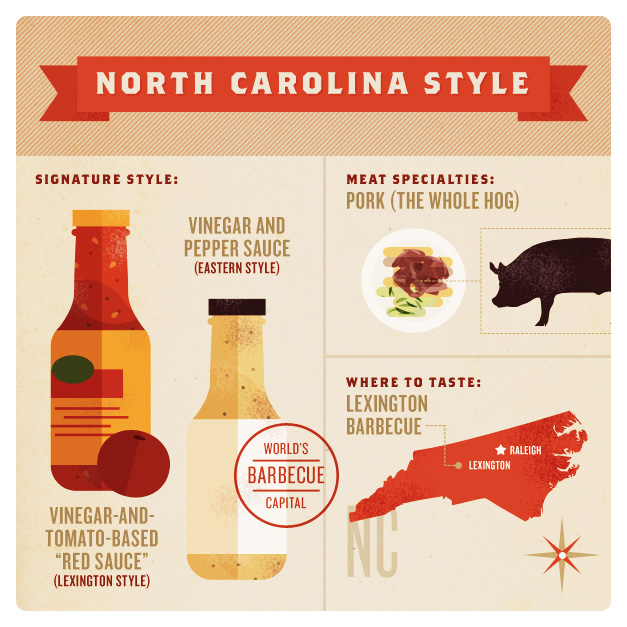
Carolina BBQ is renowned for its rich culinary traditions and unique terminology. In Eastern North Carolina, the traditional method involves slow-roasting a whole hog and basting it with a tangy and thin sauce, highlighting the natural flavors of the meat. This style is referred to as “whole hog barbecuing.” In Western North Carolina, however, pork shoulders are the star of the show. They are slow-cooked to perfection and then pulled to create tender and succulent pulled pork. The term “pulled pork shoulder” or simply “pulled pork” is commonly used to describe this regional favorite in Carolina BBQ circles.
Brisket In Carolina BBQ
In Carolina BBQ, the focus is primarily on pork, but that doesn’t mean brisket is entirely left out. While not as prevalent as in Texas BBQ, brisket does make an appearance in Carolina BBQ, especially in Western North Carolina. Here, the brisket is slow-cooked to perfection, similar to Texas-style brisket, and then served with a variety of sauces. Although pork shoulders are the more common choice in Carolina BBQ, brisket offers a unique and delicious option for those looking to explore the regional BBQ flavors.
Carolina BBQ Slang For Brisket
In Carolina BBQ, the focus is primarily on pork, but that doesn’t mean brisket is entirely left out. While not as prevalent as in Texas BBQ, brisket does make an appearance in Carolina BBQ, especially in Western North Carolina. Here, the brisket is slow-cooked to perfection, similar to Texas-style brisket, and then served with a variety of sauces. Although pork shoulders are the more common choice in Carolina BBQ, brisket offers a unique and delicious option for those looking to explore the regional BBQ flavors.
Conclusion
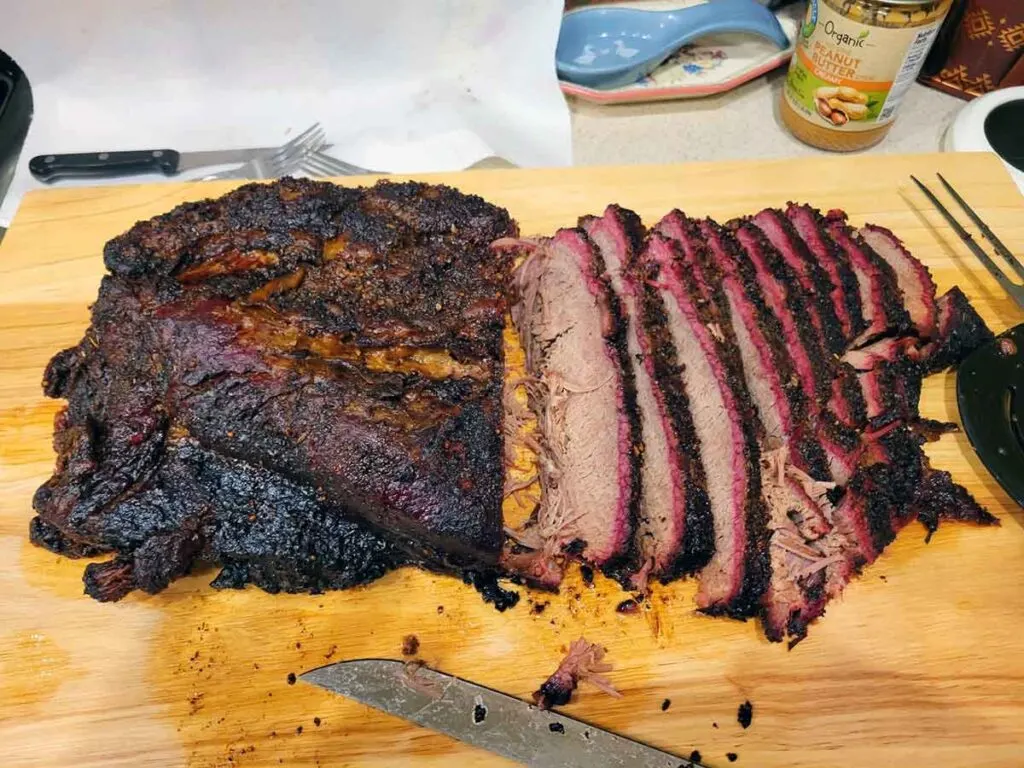
In conclusion, exploring the regional BBQ terminology for brisket reveals the rich and diverse culinary traditions across Texas, Kansas City, Memphis, and Carolina. While brisket is commonly referred to as brisket in most regions, there are unique slang terms specific to each BBQ style. From the smoky and tender Texas-style brisket to the saucy and flavorful Kansas City brisket, each region offers its own take on this beloved beef cut. The variety of names and flavors reflect the cultural significance and pride in regional BBQ traditions. Whether you call it brisket, “cue,” or “que,” one thing is for sure – it’s a delicious and iconic dish in the world of barbecue.
Summary Of Regional BBQ Terminology For Brisket
In summary, exploring the regional BBQ terminology for brisket reveals a variety of names and flavors across Texas, Kansas City, Memphis, and Carolina. While brisket is commonly referred to as brisket in most regions, there are unique slang terms specific to each BBQ style. From “cued beef” in Texas to “burnt ends” in Kansas City, the terminology reflects the cultural significance and pride in regional BBQ traditions. No matter the name, brisket remains a beloved and iconic dish in the world of barbecue.
Exploring The Cultural Significance Of Regional BBQ Traditions
Barbecue holds a deep cultural significance in regional BBQ traditions across the United States. These BBQ styles reflect the diverse history and heritage of different regions. From the smoky flavors of Texas to the tangy sauces of Kansas City and the vinegar-based Carolina BBQ, each region has its own unique way of preparing and enjoying BBQ. These traditions have been passed down through generations, representing a sense of pride and community. BBQ gatherings bring people together, fostering a shared appreciation for good food, fellowship, and the rich cultural tapestry that defines American BBQ.
FAQ: Other Names for Brisket
Q: What are other names for brisket?
A: Brisket, a flavorful cut of meat taken from the breast section of a cow, goes by several names in various culinary traditions. Some alternate names for brisket include:
- Beef breast: This is a common term used to describe brisket, as it is taken from the breast area of the cow.
- Pectoral muscle: As the brisket is the pectoral muscle of the cow, it can be referred to as such in some contexts.
- Point cut: When discussing different cuts of brisket, you may come across the term “point cut.” It refers to a specific section of the brisket with more marbling and is often used in barbecue.
- First cut, second cut: Another way to differentiate between cuts of brisket is by referring to them as the “first cut” or “second cut.” The first cut typically contains more lean meat, while the second cut has more fat.
- Deckle: In some regions, the fatty part of the brisket, also known as the point, is called the “deckle.” It is often used in deli-style sandwiches and is highly prized for its rich flavor.
- Flat cut: The leaner portion of the brisket, known for its more even thickness, is sometimes referred to as the “flat cut.”
- Burnt ends: A cherished delicacy in the world of barbecue, burnt ends are the intensely flavorful and slightly charred pieces of meat cut from the pointed end of a smoked brisket.
Q: Why are there different names for brisket?
A: The different names for brisket stem from regional variations and specific culinary contexts. Different parts of the brisket have distinctive qualities, such as marbling or fat content, which lead to the use of various names to differentiate between them. Additionally, cultural and culinary traditions often influence the names given to specific cuts of meat.
Q: Are there any specific cooking techniques associated with each brisket name?
A: While there are no hard and fast rules, certain names of brisket cuts may correlate with specific cooking techniques. For instance, the deckle or point cut is frequently used in slow-smoking or barbecuing due to its higher fat content and exceptional flavor. The flat cut, on the other hand, is often preferred for braising or oven roasting due to its leaner nature.
Q: Do other cuisines have additional names for brisket?
A: Yes, indeed! In addition to the names mentioned above, brisket is known by different names in various cuisines. For example, in Mexican cuisine, brisket is called “falda de res.” Jewish cuisine commonly refers to brisket as “pot roast” when braised or cooked in a pot. In Chinese cuisine, it can be called “niu nan” or “jing nan.” These are just a few examples of the many names and preparations that vary across different culinary traditions.
Q: How can I determine which name to use when buying or requesting brisket?
A: When buying or requesting brisket for a specific recipe or cooking method, it’s best to communicate your needs clearly. If you’re unsure about the terminology, describe the qualities you’re looking for, such as a lean or fatty cut, or discuss your intended cooking method. The butcher or retailer can then guide you to the appropriate cut based on your preferences and requirements.
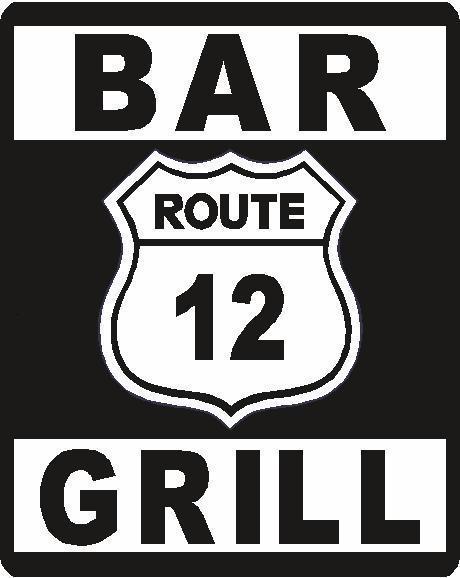
Come for The Burgers… Stay for The Beers!